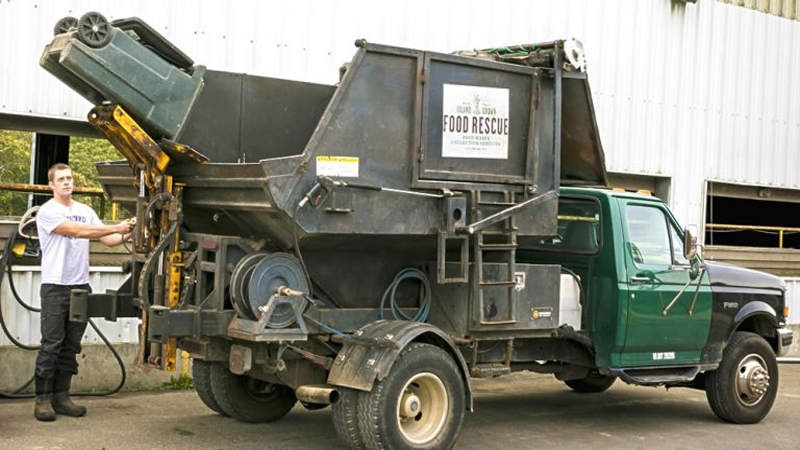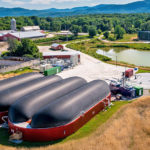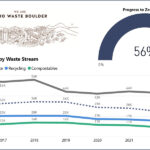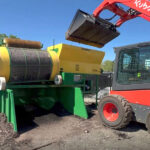Island Grown Initiative (IGI), a nonprofit that works to support regenerative food systems on Martha’s Vineyard, an island off the coast of Massachusetts, has spent the last four years collecting food waste in 32- to 48-gallon totes from restaurants, caterers, camps, and residential food waste drop-off sites at 6 transfer stations, 4 of which are operated by the Martha’s Vineyard Refuse Disposal District (MVRDD). All food waste, including meat, bones, etc. are accepted, along with paper towels and napkins.
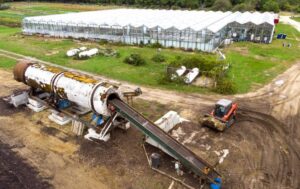
Photo by Randi Baird
By summer of 2019, IGI’s list of clients grew to 43. It collected 336 tons of food waste (not including December) — almost double the 180 tons collected in 2018. The base cost for the service is $90/month for weekly collection, and goes up in $30 increments depending on number of toters and frequency of collection, which ranges from weekly to 4 times/week for larger generators in summer.
To manage the increasing tons, IGI purchased a 1997 Ford F-Superduty food waste collection truck from The Compost Plant in Rhode Island that is equipped with a hydraulic lift on the back, and a power washing system for on-site cleanup of the toters. Contamination in collected organics is minimal. When issues arise, pictures are taken and IGI communicates directly with its clients — a benefit of having a smaller program. Contamination is screened out of finished compost.
Composting food waste on Martha’s Vineyard is no small feat due to large increases in food waste generated in the summer months. IGI also has to contend with pests — primarily rats, skunks and seagulls — and there are no predator species like coyotes or foxes on the Island, thus they tend to multiply rapidly. A local biodiversity group was worried about the food waste providing a food subsidy for these pests, which in turn eat the eggs of endangered bird species like piping plovers.
To address the challenge, IGI sought a solution that would reduce the amount of whole food waste sitting in outdoor windrows. The opportunity came up to buy a used BW Organics rotary drum from Rocky Hill Farm, in Saugus, MA. With help from a generous donor, the rotary drum was purchased and installed in June 2019, and has been successfully operating, breaking down food scraps in approximately 3 days in the drum, so they are no longer a good raw food source for pests. The partially composted material is built into outdoor windrows. This initial processing phase has eliminated the seagull problem but the rats are attracted to the warmth in the windrows. IGI is working to mitigate that situation.

Photo by Nevette Previd
To date, over 425 yards of material have gone through the machine, at an average of 4.5 tons/day, 6 days/week. Another objective of installing the rotary drum was to demonstrate in-vessel composting at a small scale in anticipation of an island-wide project through the MVRDD. As a result of the successful demonstration, MVRRD is moving forward to design and permit a larger rotary drum facility at its transfer station in Edgartown.
About 360 cubic yards of finished compost produced in 2018 were screened in March 2019. About half was sold to the community, and the other half used for IGI’s other programs including school gardens, a community garden, and a regenerative agriculture program. The same will be done in 2020 with material from 2019.
Authors of this update are Sophie Abrams Mazza, IGI Food Equity And Recovery Director, and Bob Spencer, BioCycle Contributor.


